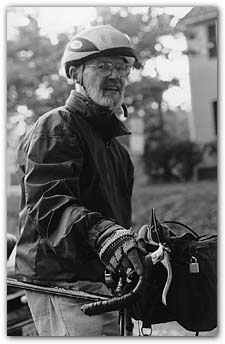Main Menu · Search ·Current Issue ·Contact ·Archives ·Centennial ·Letters to the Editor ·FAQs
![]()
| Home | Second Calling |
| Vietnam through Women's Eyes | Yesterday's News |
| Follow the Music | |

|
| Ever since volunteer Bill Batchelor became legally blind three years ago, he has made it to weekly client visits and committee meetings by bicycle. |